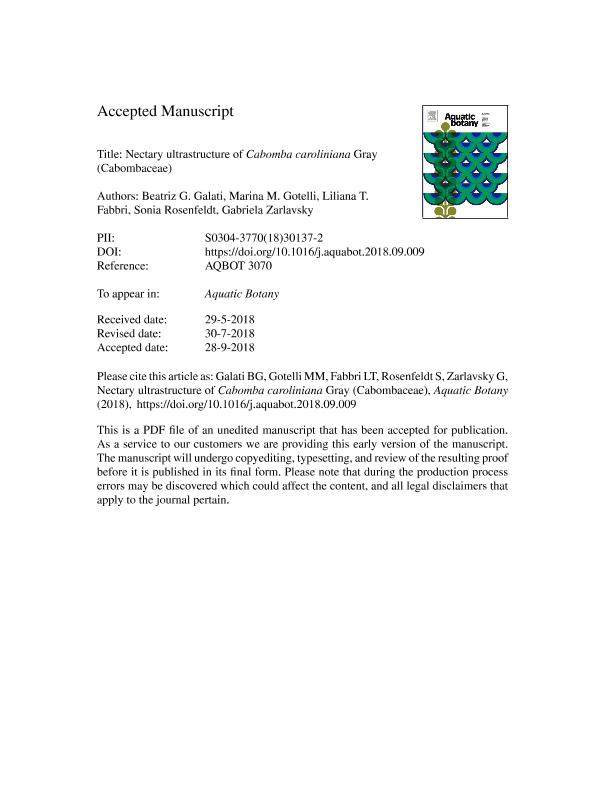Mostrar el registro sencillo del ítem
dc.contributor.author
Galati, Beatriz Gloria

dc.contributor.author
Gotelli, Marina María

dc.contributor.author
Fabbri, Liliana Teresa

dc.contributor.author
Rosenfeldt, Sonia

dc.contributor.author
Zarlavsky, Gabriela Elena

dc.date.available
2021-04-23T17:45:15Z
dc.date.issued
2019-01
dc.identifier.citation
Galati, Beatriz Gloria; Gotelli, Marina María; Fabbri, Liliana Teresa; Rosenfeldt, Sonia; Zarlavsky, Gabriela Elena; Nectary ultrastructure of Cabomba caroliniana Gray (Cabombaceae); Elsevier Science; Aquatic Botany; 152; 1-2019; 43-50
dc.identifier.issn
0304-3770
dc.identifier.uri
http://hdl.handle.net/11336/130787
dc.description.abstract
Cabomba Aubl. is a genus considered as a potential genetic model for studies of early angiosperm evolution, accordingly, it is important to expand the knowledge of it. This paper reports the study of the anatomy and the ultrastructure of the nectary of Cabomba caroliniana Gray using bright-field microscope, scanning and transmission electron microscope in order to understand its secretion mechanism. C. caroliniana has protoginous flowers and the anthesis lasts two days. Nectaries of C. caroliniana are located in two basal lobes or yellow auricles of each white petal. Most nectar is observed in the area above the pronounced auricles. The secretion is released mainly by the four-cellular trichomes or hydropotens present in both nectary epidermis. The cellular ultrastructure indicates that the nectary is active during the two days of the anthesis. This agrees with the fact that in both anthesis days the fertile structures of the flower (first the stigmata and then the anthers) are disposed above the nectaries. The nectar secretion mechanism is discussed in relation to the present knowledge. The results of this study are related to what has been described for other basal angiosperms.
dc.format
application/pdf
dc.language.iso
eng
dc.publisher
Elsevier Science

dc.rights
info:eu-repo/semantics/openAccess
dc.rights.uri
https://creativecommons.org/licenses/by-nc-sa/2.5/ar/
dc.subject
CABOMBA
dc.subject
HYDROPOTENS
dc.subject
NECTARY
dc.subject
ULTRASTRUCTURE
dc.subject.classification
Ciencias de las Plantas, Botánica

dc.subject.classification
Ciencias Biológicas

dc.subject.classification
CIENCIAS NATURALES Y EXACTAS

dc.title
Nectary ultrastructure of Cabomba caroliniana Gray (Cabombaceae)
dc.type
info:eu-repo/semantics/article
dc.type
info:ar-repo/semantics/artículo
dc.type
info:eu-repo/semantics/publishedVersion
dc.date.updated
2021-04-06T18:41:32Z
dc.journal.volume
152
dc.journal.pagination
43-50
dc.journal.pais
Países Bajos

dc.journal.ciudad
Amsterdam
dc.description.fil
Fil: Galati, Beatriz Gloria. Universidad de Buenos Aires. Facultad de Agronomía. Cátedra de Botánica General; Argentina
dc.description.fil
Fil: Gotelli, Marina María. Universidad de Buenos Aires. Facultad de Agronomía. Cátedra de Botánica General; Argentina. Consejo Nacional de Investigaciones Científicas y Técnicas; Argentina
dc.description.fil
Fil: Fabbri, Liliana Teresa. Universidad de Buenos Aires. Facultad de Agronomía. Cátedra de Botánica General; Argentina
dc.description.fil
Fil: Rosenfeldt, Sonia. Universidad de Buenos Aires. Facultad de Ciencias Exactas y Naturales. Departamento de Biodiversidad y Biología Experimental; Argentina
dc.description.fil
Fil: Zarlavsky, Gabriela Elena. Universidad de Buenos Aires. Facultad de Agronomía. Cátedra de Botánica General; Argentina
dc.journal.title
Aquatic Botany

dc.relation.alternativeid
info:eu-repo/semantics/altIdentifier/url/https://linkinghub.elsevier.com/retrieve/pii/S0304377018301372
dc.relation.alternativeid
info:eu-repo/semantics/altIdentifier/doi/http://dx.doi.org/10.1016/j.aquabot.2018.09.009
Archivos asociados
